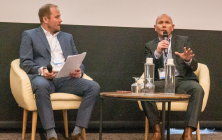
Operating in 188 countries, Nestlé, the world’s largest food and beverage company, has created ambitious sustainability targets covering areas including energy, water stewardship, human rights and child labour.
Ryan McNeill, the company’s R&D sustainability lead for global confectionery, gave insights into how these targets are tackled in a conversation at Environment Analyst’s recent UK business summit. "It’s up to each of our businesses — from coffee and confectionery to drinks and food service — to look at those targets and understand what’s important for their own brands, in order to prioritise," he said.
McNeill described the process as "a huge task" right across the business — but one that makes sense both commercially and from an ethical standpoint.
Net zero by 2050
Nestlé has committed to reaching net zero by 2050, with a 20% reduction in ghgs by 2025 and a 50% reduction by 2030, against a 2018 baseline of 92 million tonnes of emissions. The company is also committed to using 100% renewable electricity by 2025 and, more widely, to focus on nature-based solutions such as soil management and forest restoration to address climate change.
Alongside carbon reduction, Nestlé has built broader sustainability approaches — for example in areas like human rights and community education — "into its DNA", said McNeill, adding that "everything starts with collaboration and engagement."
To these ends the company’s focus on the value chain — notably growers and farmers, but also incorporating logistics and brand messaging — has to be razor sharp, said McNeill. "Our manufacturing base will have a good grasp of [its] carbon footprint, but for the thousands of ingredients we source from all over the world it can be more difficult: you start to encounter huge problems around information."
Nestlé estimates that around 95% of its emissions are indirect (scope 3) emissions from its value chain.
Extreme pragmatism
The solution, McNeill suggested, is extreme pragmatism. This means using available data and statistics and working with suppliers and partners out in the field — an appropriate term given the company’s reliance on agriculture. Dairy and livestock supply chains, for example, accounted for 34.2 million tonnes of ghg emissions in 2018. Another focus, he said, is social and community issues. For example, the company is incentivising social & environmental practices with cocoa farmers through Nestlé’s Income Accelerator program. This aims to help close the living income gap and reduce child labour risk, with the first phase supporting more than 1000 farms in the Ivory Coast in 2023.
To address the scope 3 challenge, said McNeill, Nestlé works directly with farmers, on everything from regenerative agriculture to improve their yields, incomes and overall efficiency, to tackling social issues.
"We work with around 600,000 farmers that supply Nestlé globally. This can mean everything from partnering a dairy farmer in India who has two cows, to working with a farmer in Scotland with 200 cows. You have to understand the technicalities of very different farming systems and you have to find ways to add value to the farms and to the communities in which they operate.
"Basically we’re incentivising farmers to embed sustainable practices into everything they do. This can extend to working with communities to improve access to education, and supporting women at work, both of which can have significant impacts on yields and on environmental protection."
Another major target for the company is to make sure its supply chain is deforestation-free by 2025. This involves a risk-analysis based approach for supplies such as palm oil, meat, soy and sugar, in partnership with suppliers.
Forest protection
"Around 96% of emissions coming out of West Africa are associated with deforestation so this is really fundamental. We are moving towards fully certified cocoa in the region and working with partners to protect huge areas of forest," said McNeill.
The work requires spending big chunks of time in the field to assess and measure areas at most risk and establish priorities. Technology is also playing an important part — for example satellite solutions for mapping and monitoring, alongside partnerships with research centres in the US, France and Switzerland, as well as pioneering work by Nestlé’s own confectionery R&D centre in the UK. "We’re also working with satellite companies to develop new approaches to tracking farm regeneration," said McNeill. The challenge is to develop a tool which will help to set common standards across farms and help meet our targets."
Another tactic being adopted by Nestlé, said McNeill, was to adopt a "landscape" approach, which entails looking beyond the boundaries of the farm, to see how ecosystem services can contribute to the environmental protection and sustainability of not only agricultural land but also, say, a nearby area of forest.
"We need to demonstrate to industry and to society that getting involved in this type of environmental protection is the right thing to do. The landscape approach is a more cost-effective way to implement regenerative farming, collaboratively leveraging investment across multiple partners, and we want to keep advocating for that."
On a lighter note, McNeill couldn’t resist reminding his pre-lunch summit audience that confectionery brands like Kit-Kat are not only delicious but are also now being produced with minimal waste. How’s that for the sweet taste of sustainability?
